Commencement 2023
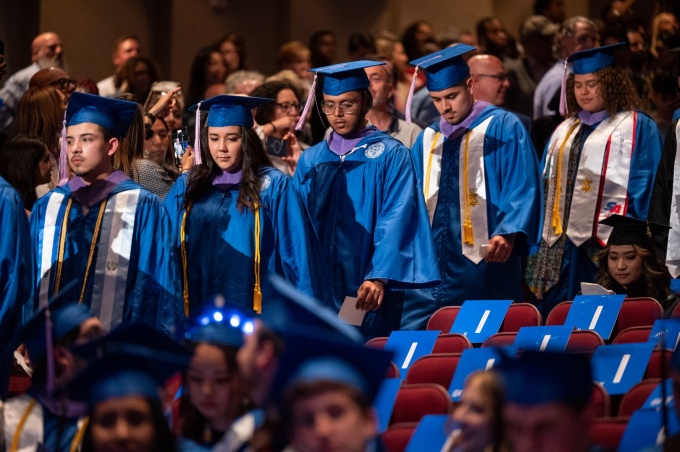
On May 19, 2023, the School of Architecture and Planning graduated its 51st class. Photos by Onion Studio
51st Commencement
On May 19, 2023, more than 180 graduates crossed the stage as the 51st graduating class of the School of Architecture and Planning. Graduates and their families and friends, along with distinguished guests, joined together at UB's Center for the Arts as UB held its first fully in-person commencement season since the start of the pandemic.
View an accessible PDF of the program, including a listing of all graduates.
On This Page
Among the ceremony's distinguished guests were University President Satish K. Tripathi who served as degree conferrer, Dean Robert G. Shibley, who presided as master of ceremonies and presented the keynote address, members of UB and SUNY leadership, partners in the professions, faculty of the School of Architecture and Planning, and members of the School's Dean's Council. Dale White and Gail V. Wells were presented with the Dean's Medals, the highest honor bestowed by the School.
President Satish K. Tripathi called upon the Class or 2023 to carry UB's mission of excellence, impact and service into the world by embracing the perspective of "lifelong learners."
"With UB's mission in your heart, you will have a vision to see our shared humanity even in polarizing times. You will elevate the public discourse with resasoned, fact-based contributions and with respect for opposing viewpoints. In times of challenge and strife, you will not respond with reflexive panic or blame. Instead, you will work calmly, taking greater risks toward sustainable solutions. With our mission as your guide, you will make your way through the world with your eyes trained not on the bottom line but on the greater good."
Photo Gallery
Photos by Onion Studio
Keynote address
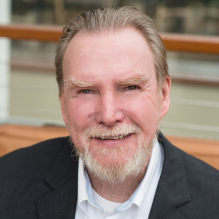
"My hope for you this commencement is that you find joy and challenge in the work and places you choose to live. I hope you find paths that let you make beautiful places, facilitate just communities, and build relationships consistent with the aims of practice we have collectively constructed during your time with us. It has been a pleasure and a privilege to be your Dean and to work with an extraordinary group of faculty, staff, students, and senior UB leadership."
Robert G. Shibley
Dean and SUNY Distinguished Professor
Robert G. Shibley hosted his 13th Commencement as Dean of the School of Architecture and Planning, delivering his final address to graduates as he prepares to step down from his leadership post. Calling upon the School's founding mission more than 50 years ago, Shibley reminded graduates of the deep tradition of innovation behind their work, and the reach of its impact. "Collectively, we have established the conditions for hope in the world through acts of design innovation, policy research, planning, and building."
It was just over a year ago when a horrific act of racist hate in Buffalo - the mass shooting at Tops Supermarket on Buffalo's East Side that took the lives of 10 people - reminded us how far we have to go as a society, as a city, and as a profession. The imperative - and call to action to our graduates - is to bring our whole selves to action on behalf of justice in our city and our world. "Architecture, urban planning and real estate development are, and must become even more, relevant in the face of our challenges."
Shibley, a leading scholar in the fields of architecture and urban planning widely recognized for his work on the theory and practice of placemaking, urged the Class of 2023 to root their ideas and ambitions in the aspirations of the people and places we serve as professionals in the built environment. "Plan-making and construction are critical and deserve every care, craft, and design skill we offer. Still, they should never be allowed to eclipse the human and ecological relationships that are their raison d'être – their reason for being – establishing the relevance of our professions."
This commencement is your day! Congratulations to the graduating class of 2023! Commencements and everything that builds up to them are among the best of team sports. The commencement congratulations come with a robust thank you to the parents, friends, loved ones, faculty, staff, and the UB Senior leadership that helped make it possible. Think of today as your victory celebration.
Thank you, President Tripathi, for that introduction and the consistent and brilliant way you have steered the UB ship as provost and now as our president. Today is my 13th opportunity to host the School of Architecture and Planning Commencement at UB as Dean. During my term, we have had inspiring messages at these events from John Paul Eberhard, Bill McKibben, Howard Zemsky, Toshiko Mori, Henry Cisneros, Diane Georgopoulos, Maddy Burke, and our own Professor and Chair Daniel Hess, and Charles Davis, to name a few.
John Eberhard, our founding Dean, reminded us in his address of the School's origins – those origins we’re steeped in the aspirations to educate students that are immediately employable in the current approaches to professional practice. And, the School was founded on the idea that it was even more essential to develop students who can think critically about ways to advance the relevance of their professions. Like all of our commencement speakers, we want and need the professionals that make the world go well beyond current practice conventions.
Since our founding over 50 years ago, the University at Buffalo's School of Architecture and Environmental Design –now Architecture and Planning -- has creatively innovated on how and what we teach, research, and how we serve. Collectively we have established the conditions for hope in the world through acts of design innovation, policy research, planning, and building. In grounding our work in the aspirations of our community and a shared affection for the place, we rebuild our city and region, improve its citizens' lives, and drive innovations to scale, serving people and cities worldwide.
On May 14, 2022, a horrific act of racist hate sent shockwaves through our city, and we were reminded just how far we have to go—as a society, as a city, and as a profession. The mass shooting at a grocery store in East Buffalo was the collision of an acute act of violence with an equally insidious legacy system of segregation in our cities that isolates, neglects, and harms segments of the population along the lines of race. East Buffalo, where 80 percent of Buffalo's Black population resides, has suffered decades of disinvestment. The systems of inequity are so deeply embedded that over the past three decades, the city's
Black community has seen little progress (and in some cases none at all) on key indicators of quality of life—from income and educational attainment to homeownership and health outcomes. As a community of educators, scholars, and practitioners in the built environment professions, we grieve the loss of life, the trauma inflicted upon our city, and society's shortcomings in addressing the entrenched injustices of racism. May 14 calls attention—yet again—to one of the most severe challenges of our time—rebuilding our cities and making places to accommodate a rapidly urbanizing population where ALL have the opportunity for life well lived.
Buffalo and its East Side is ground zero for more just ways of living, and a lever of change for all cities. Drawing upon the guidance of climate activist Joanna Macy and psychologist Chris Johnstone, it is here where we come with gratitude to teach and practice "active hope" with the people of Buffalo and around the world – project by project, increment by increment, year over year. Today, this active hope continues to lift up a new wave of design, planning, and development innovations across the urban landscapes of Buffalo's East Side, focused squarely on the needs and aspirations of our most vulnerable citizens. Learning with our community turns ideas into action while building capacity among citizens and our students—future architects, planners, and developers—
for the long-term work of equitable placemaking. The imperative and opportunity before us is to dig in and bring our whole selves to action on behalf of justice in our city and our world.
Architecture, Planning, and Real Estate are, and must become even more, relevant in the face of our challenges. You have been part of the transformation of these professions in this search for increased relevance, and our School is leading that charge. We have come a long way building on our professional and academic preoccupations with literary criticism, modern, post-modern, and deconstructivist philosophy, and problem-seeking with problem solving behaviors. Building on this base, we have fully embraced, for example, the urgency of climate change, a global pandemic, environmental health, anti-racist practice, affordable housing, and all of placemaking's social, cultural, and ecological implications. We have found a way to plan, design, build, and develop that embraces the intersections and interdependence of all aspects of our work. Perhaps more importantly, we have come to understand the aims of our practices. The artifacts we produce are not the goals. They are the vehicles we use to forge relationships between people and the ecologies and experiences of place. The creation of our artifacts also enable sustainable and resilient connections among people in places. Fundamentally, our job is to situate the artifacts of our work– the plans, designs, policies, financial models, and building projects - in the context of the relationships needed to realize, live in, and sustain them as well as adjust them over time. Plan-making and construction are critical and deserve every care, craft, and design skill we offer. Still, they should never be allowed to eclipse the human and ecological relationships that are their raison d'être – their reason for being – establishing the relevance of our professions.
Over a decade, all of the commencement speakers spoke to this insight. And, frankly, they all speak to the heart of our education program and aspirations for your practices. They are all about our aims of a professional practice focused on RELATIONSHIPS between PEOPLE AND PLACES AND among PEOPLE IN PLACE. The culture of practice, the character of a place, the planning and design, contributions to the quality of life are central to why we do what we do. As critical, is the way by which place-making establishes long-term relationships among people and the places made. People come to care for and, yes, love their places -- supporting the ecological, social, behavioral, esthetic, and economic relationships we have with where we live, work, and engage others. As such, our placemaking becomes part of a democratic practice where we all learn what it means to be citizens though discreet acts of planning, design, and development. I love this word citizen because it immediately connotes the agency we have as single individuals as it also affirms the necessity of relationships forged in collective action rooted in respect, justice, and love. Every one of our commencement speeches over the past 13 years is as valid today as it was when they were offered. That tells us something about the slow rate of our progress and the nature of the long game we have to be good at playing. This text is not an argument to go slow; on the contrary, the challenges and opportunities in front of us demand quick inquiry and action. And they also require us to think several moves ahead – in Buffalo vocabulary – we need to skate to where the puck is going and play the long game, even as we keep making shots on goal.
Thank you, all of you. I am in my 41st year with the School and concluding the best job I have ever had as your Dean. My hope for you this commencement is that you find joy and challenge in the work and places you choose to live. I hope
you find paths that let you make beautiful places, facilitate just communities, and build relationships consistent with the aims of practice we have collectively constructed during your time with us.
It has been a pleasure and a privilege to be your Dean and to work with an extraordinary group of faculty, staff, students, and senior UB leadership.
Again, CONGRATULATIONS TO THE CLASS OF 2023!
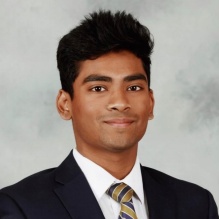
Sabri Hafiz Uddin (BS Arch '23)
Commencement student speaker
Sabri Hafiz Uddin, a member of the BS in Architecture Class of 2023, served Student Speaker, reflecting on his experience at UB’s School of Architecture and Planning and how it has prepared him to take on the grand challenges facing the built environment today. Uddin, a Canadian American and child of Bangladeshi immigrants, highlighted the program's celebration of diversity in design and its vibrant studio culture, where he built relationships with faculty and students that will last a lifetime.
Dear fellow graduates, President Tripathi, Dean Shibley, distinguished guests, faculty, friends and family: Today is a momentous day that we will all remember for the rest of our lives. As we sit here together, ready to embark on our next journey, I want to take a moment to reflect on our time here at the University at Buffalo School of Architecture and Planning.
While we may have approached the challenge of building a better world with different tools and perspectives, we share a common goal to shape the built environment in a way that makes a positive impact on the lives of those around us.
Coming from a diverse background as a Canadian American and child of Bangladeshi immigrants, it has been inspiring to see how our professors have encouraged us to embrace and celebrate diversity in our designs. They have taught us to create spaces that reflect the unique cultures and identities of the people who inhabit them. Furthermore, the professors go above and beyond for their students, providing mentorship and guidance that extends far beyond the classroom.
Stepping into our first architecture studio in the basement of Crosby Hall, I knew that I had found my home. I will always remember the intensity of those studio sessions, working tirelessly through the night alongside my fellow classmates. It was an experience that brought us all together, pushing us to collaborate and problem-solve. It is incredible how far we have come from folding paper, cutting pieces of wood, foam (and sometimes my fingers!) to creating well developed projects, drawings and models far beyond our initial skill set.
Through these experiences, I have come to understand the true value of community. Our School of Architecture and Planning is not just a place to learn; it is a place to grow, to make connections, and to build relationships that will last a lifetime. It is a place where we can learn from each other and collaborate to make a positive impact on the world.
As we move forward from here, let us take the lessons that we have learned and the experiences that we have had at UB and apply them to the world around us. Let us work together to build a better world, one that is sustainable, just, and equitable for all. In conclusion, I want to thank the faculty, staff, and students of the School of Architecture and Planning for providing me with an education and a community that I will cherish for the rest of my life.
As we mark this momentous occasion, let us carry with us the fearless determination of the University at Buffalo's slogan, "Here is How We Lead the Charge," and use our education and skills to lead by example and drive positive change in the world around us.
Awards
Department of Architecture
Alpha Rho Chi Medal: Stephanie Lynn Tomasulo (BA Arch '23)
ARCC/King Student Medal for Excellence in Architectural and Environmental Research: Keith David Benes (MArch '23)
AIA Medal for Academic Excellence: Joselyne E. Morocho (MArch '23)
Department of Urban and Regional Planning
MUP Best Professional Project Award: Nolan Walter Kukla (MUP '23)
AICP Planning Excellence Award: Alessandra Rose Santarosa (MUP '23)
Dean's Medal Winners
This year, we were honored to present the Dean's Medal - the highest honor bestowed by the School - to two distinguished UB alumni who have dedicated their life and careers to the advancement of equity and social justice through community development and urban planning.
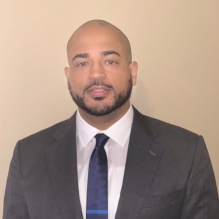
Dale White (BAED '05)
Dale White, a 2005 graduate of our BA in Environmental Design program, is a real estate developer focused on equitable, green community development. He currently serves as principal for acquisitions and development at Bastogne Development Partners, driving social impact investment through community-based development and affordable housing.
A dedicated friend of the School, Dale was recently appointed as our Inaugural Fellow in Affordable Housing. His interest in equity in the built environment began as a child growing up in Buffalo. He was nine years old when he began to wonder why East Buffalo was full of blight, while other neighborhoods just a couple of miles away were vibrant. "[My work] all stems from finding a solution for my hometown. We have an opportunity to build back our cities equitably."
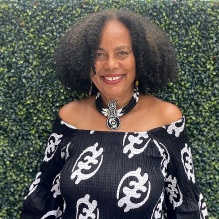
Gail Wells (MS '02, BA '94)
Gail Wells, who holds a master's degree in urban planning and a bachelor's degree in public policy and urban planning from UB, is a social activist, historian, urban planner, gardener, entrepreneur and educator. Founder of Buffalo Freedom Gardens, she is part of a coalition of food justice advocates working across Buffalo to build resilience in communities of need.
A long-time partner of the School's Food Systems Planning and Healthy Communities Lab, the urban farmer has advanced her work in food justice through as a Champion for Change in our Citizens Planning School and through efforts like Buffalo Freedom Gardens, which she founded in 2020 to build access to fresh food in neighborhoods the lack grocery stories, including the East Side of Buffalo. A spirited member of UB's alumni community, Gail shows us what's possible when we dedicate ourselves to justice. "If you listen to the people and use your education, you can make change happen."
Questions? Contact us!
ap-commencement@buffalo.edu
(716) 829-5905
